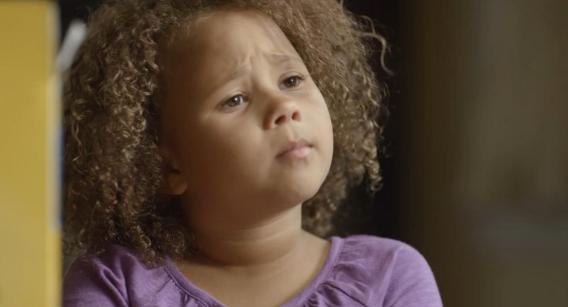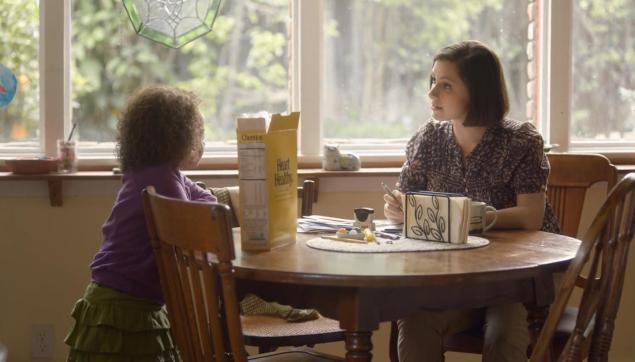Interracial Cheerios Ad Commentary Begs Question if Advertising is Ready For Mixed Races

 We have come a very long way since Dr. Martin Luther King, Jr. first had his Dream. Homosexuals are no longer asked to mask their sexuality in order to participate in the honor of defending our freedom. Same sex marriage is on the verge of being accepted in more states than not. We elected a Black President... Twice. We have made strides in terms of diversity in this country right? Well maybe not so fast. Despite the US Census showing a rise in individuals classifying as "Multiracial" and an emergence of interracial couples in television and media, Madison Avenue, as Ad Age reported last year, hasn't yet gotten the memo. Judging by the unfortunate response to a new Cheerios ad, perhaps they are justified in their apprehension.
We have come a very long way since Dr. Martin Luther King, Jr. first had his Dream. Homosexuals are no longer asked to mask their sexuality in order to participate in the honor of defending our freedom. Same sex marriage is on the verge of being accepted in more states than not. We elected a Black President... Twice. We have made strides in terms of diversity in this country right? Well maybe not so fast. Despite the US Census showing a rise in individuals classifying as "Multiracial" and an emergence of interracial couples in television and media, Madison Avenue, as Ad Age reported last year, hasn't yet gotten the memo. Judging by the unfortunate response to a new Cheerios ad, perhaps they are justified in their apprehension.
The television spot, which features an adorable interracial girl, black father, and white mother, has taken this innocent commercial and thrown it directly into the fire of controversy. Comment threads from YouTube to Facebook were polluted with racist remarks and insensitive jokes.
“If the dad was stereotypical black," one comment read. "I don't think they would have needed more than 2 actors for the commercial.”
It got so bad General Mills, Cheerios' parent company, had the comments section on the Cheerios YouTube page disabled.
“The comments that were made in our view were not family-friendly, and that was really the trigger for us, you know, to pull them off,’’ said Camille Gibson General Mills , Vice President for Marketing, said on NBC’s “Today” show on Monday.
According to the U.S. Census Bureau, 9 million people reported during the 2010 U.S. Census that they are of two or more races. 16 states recorded 200,000 or more people identifying themselves as more than one race. California, Texas and New York reported upwards of a half a million people who identified themselves as more than one race
With statistics like this, it begs the question: Are interracial relationships the new civil rights frontier? We have, by no means, reached Dr. King's "mountaintop" with regard to traditional single-race relations and LGBT acceptance but with exponential populous growth of interracial couples and multiracial children, one would assume the hand of advertisement agencies is going to be forced at some point.
I'd be foolish to assume that these changes would be a result of some higher feeling of responsibility to diversity. That will never be the case. MONEY is the root of all... advertising. But as brands become more competitive for this changing demographic, what will be the response from their core single race audience?
Yesterday, Donny Deutsch, the chairman of advertising agency, Deutsch Inc. and NBC's advertising consultant applauded Cheerios’ bold decision but understands why some companies would shy away from it.
“What’s unfortunate is that I still think 97 percent of companies would stay away from this because they would say, ‘I don’t need the letters, Deutsch said on NBC's TODAY. “Fringe crazy people go crazy about everything, but in reality you’re making a statement about your company: ‘We’re progressive, we’re inclusive, we are about today.’"
Historically, there has been very little track record for interracial couples in adverting. Most notably, a 2004 Verizon spot featuring a white father and a Latina mother. But unlike the Cheerios spot, the disparity in skin pigment was far less apparent, and by no means intended to make any sort of ethnic statement.
Lynne Collins, a spokeswoman for Saatchi and Saatchi, the ad agency which produced the commercial said, “It is important for us to make sure the work reflects the people we’re trying to sell products to.”
 Hmmmm. Maybe Cheerios and Saatchi were going for a bold statement? After a few views you can make the argument the father's race was the punchline, the big reveal... the climax, thumbing their nose with a wink, wink-nod to diversity. Perhaps that alone, not any one or a mix of complexions, is what set the comments ablaze.
Hmmmm. Maybe Cheerios and Saatchi were going for a bold statement? After a few views you can make the argument the father's race was the punchline, the big reveal... the climax, thumbing their nose with a wink, wink-nod to diversity. Perhaps that alone, not any one or a mix of complexions, is what set the comments ablaze.
Although presumably represented by a small fraction of the population, there are many Americans, black, white or other, who loathe the idea of “race-mixing.” Could this lead to alienation and a potential boycott of their products? Common wisdom would presume that's silly but if the Cheerios YouTube page comment section was any evidence, we'd be surprised how often "common wisdom" is exercised.
Share this
You May Also Like
These Related Stories

Tactics a Multicultural Advertising Agency Can Use

Think Better: 4 Winning Strategies inspired by Toyota's T2 Way of Thinking


